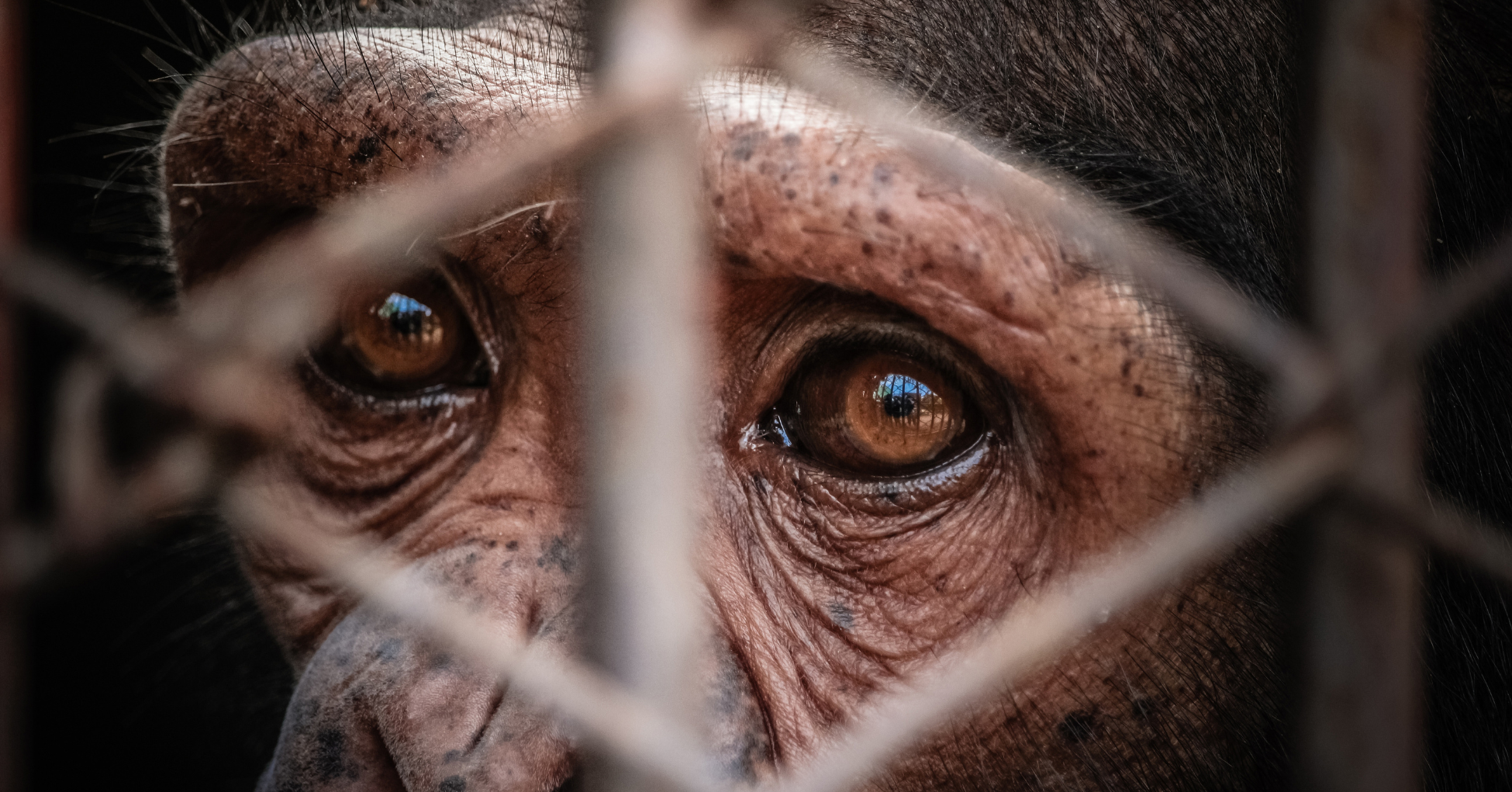
NIH Imprisons Chimps, Enriches Charles River at Same Time
Recently, the New York Times highlighted (and we featured in our news recap) the NIH’s continued refusal to allow twenty six chimpanzee survivors of animal experimentation to be moved from the Alamogordo Primate Facility on New Mexico’s Holloman Air Force Base to sanctuary.
The chimpanzees remain “imprisoned in the same place where they were tortured” some 24 years after the passage of a bill that contemplated their sanctuary retirement and almost ten years since the NIH announced an end to biomedical testing on chimpanzees.

It’s a tragic story – the ending of which we advocates continue working hard to change. But, it’s not a surprising one . . . if only we follow the monkey.
The status quo sees the public (us!) actively funding the suffering of chimpanzees and the enrichment of the animal research industry.
The inner workings of the perverse and pervasive collusion between the federal government and the private animal research industry can be summed up in two words: “money drives”. In fact, the continued incarceration of the Alamogordo chimpanzees is but one (tragic) case study.
That’s because keeping the chimpanzees out of sanctuary is beneficial to one of the largest players in vivisection: Charles River Laboratories, “the world’s largest animal breeder, importer, and private supplier of animal ‘models’ for research”, which – by way of a private “contract deal” with the NIH – gets paid to operate the Alamogordo Primate Facility.
This means that keeping the chimpanzees out of sanctuary and in lab cages enriches the NIH’s incestuous bedfellow Charles River Laboratories by “untold millions of dollars over [the chimpanzees’] lives….”
Sickeningly, these ill-gotten gains represent just some of the hundreds of millions of dollars paid by the NIH to Charles River Laboratories over the years – including a 2001, 10-year, $42.8 million contract “for care and maintenance of the [Alamogordo] chimpanzees.” (Additionally, and more generally, Charles River Laboratories boasts of “provid[ing] products and services to support all elements of basic research conducted” and funded by the NIH.)
The particular financial arrangement at play with the Alamogordo chimpanzees continues despite the proven harm being caused to the animals. Public records show that, between 2001 and 2010, 62 chimpanzees died at Alamogordo”, including as a result of “‘neglect by personnel’”. And, in 2004, Charles River Laboratories and the director of the Alamogordo Primate Facility “were charged with three counts of animal cruelty for the deaths of two chimpanzees, Ashley and Rex, and the neglect and suffering of a third chimpanzee, Topsy . . . Sadly, the cruelty charges were dismissed on a legal technicality having nothing to do with the merits of the case.”
And, it gets even more outrageous, because the NIH is spending more of our tax dollars to keep the chimpanzees at Alamogordo than it would spend to send them to sanctuary.
In 2023, the NIH estimated that it costs $129 per day to “care” for each chimpanzee at the Alamogordo Primate Facility.

This figure stands in stark contrast to the $52 per day that chimpanzee sanctuary care would cost – thereby representing a huge difference in cost over the course of the animals’ lifetimes – and it means that it would be 2.5 times cheaper for the NIH to send the chimpanzees to sanctuary than it is to keep them at Alamogordo.
Yet, the NIH continues to refuse to provide the chimpanzees with better care at a cheaper cost.
The problematic nature of the NIH’s unchecked power is on full display here, having created and maintained the unethical, financially indefensible, and collusive paradigm at play.
Just scratching the surface, we find that:
- The federal government’s purported justification for keeping the chimpanzees at Alamogordo is predicated on assertions by veterinarians paid by Charles River Laboratories (the for-profit corporation that would lose millions of dollars annually if the chimpanzees were sent to sanctuary). Indeed, the NIH panel determining that the chimpanzees need not be moved to sanctuary – (because, as Charles River Laboratories’ veterinarians state, they are too unwell – (a) has never seen the animals themselves and (b) is relying entirely on the word of Charles River Laboratories, with the NIH denying outside veterinarians, primatologists, and other experts access to the chimpanzees for years.
- The NIH has been empowered (and allowed!) to unilaterally and completely control access to the chimpanzees: anyone – including members of Congress – who wants to access the Alamogordo Primate Facility must apply for the NIH’s permission; and – to the knowledge of expert commentators – the NIH last approved such an application in 2010 . . . fourteen years ago.
How can this be? Because – effectively – we (you and I) are being forced to enable it.
Because Charles River Laboratories holds a contract with the NIH, it really holds a contract with us, the taxpayers – meaning, they have made us complicit in the continued imprisonment of the Alamogordo chimpanzees.
Plainly, this does not serve our interests as U.S. citizens, much less champions of an ethical and just world for all species. Indeed, if our actual interests were being furthered, the chimpanzees would long have been moved to sanctuary – something that the NIH could easily make happen:
The NIH’s 2025 budget is slated to exceed $48,000,000,000, while the cost of providing lifetime sanctuary to all chimpanzees in need (including but not limited to those being held at Alamogordo) is projected at approximately $60,000,000 – or about one-tenth of one percent of the NIH’s budget.
The (only) rub: the NIH’s untoward collusion with private industry leader Charles River Laboratories would take a hit.